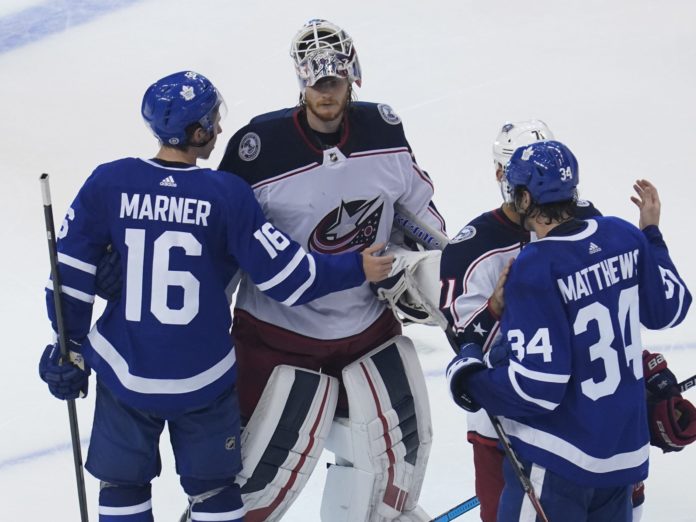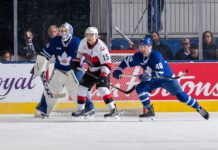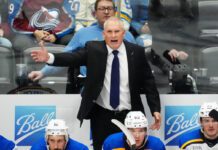
As the Toronto vs. Columbus series post-mortems continue, Blue Jackets assistant coach Brad Shaw provided great insights into the mindset of his team over course of the rollercoaster five-game series on TSN radio on Tuesday morning.
Among the more interesting nuggets in the interview, Shaw mentioned that the fan-less environment made it a lot easier for the Blue Jackets to reset after their Game 4 collapse. The Columbus defense and penalty killing coach also complimented Sheldon Keefe’s decision to load up his top line late in Game 4 and into Game 5, admitting that a bounce here or there — such as on John Tavares’ empty-net post — could’ve easily tipped the balance of the game and series.
On how the series played out:
A lot of Toronto’s strengths are similar to what the strengths are in Tampa. A lot of our prep was a lot of the same verbiage and the same concepts on what we wanted to try to do on the ice. I think that kind of helped us.
Game 1, we came out and played pretty much the ideal game. Korpi was unreal in net like he has been for a lot of this year. He made some key, timely saves and we left the building feeling like we should be okay here. We think we’ve got these guys figured out.
It is almost like when you go golfing and you shoot eight shots under your normal score and you think you’ve got it figured out, but the next time you shoot 105. We come out for Game 2 and absolutely lay an egg. Toronto is a bit better prepared and basically dominated the whole game. It is kind of an “uh oh” moment for a coach. You wonder if the belief is still there.
We tried to regroup. We knew we had back-to-back games coming up in Games 3 and 4 which was going to be a chore in itself. To get down 3-0 in Game 3 was not a great feeling. It wasn’t that we weren’t playing better than Game 2, but we were down 3-0. All of a sudden, Pierre-Luc Dubois decided to do what he did and put the team on his back, got us to 3-3, and got us the OT winner.
We just had to keep playing. We were getting big saves. In that same game against Tampa last year, Bobrovsky makes a save in the second period on the PK on a Stamkos one-timer to keep it 3-0. After we spent the whole intermission talking about believing in our team instead of watching them play, Bob kind of sparked that.
I think we were able to throw out Game 2. You hope not to have those games in the playoffs, but we were also only a week into the season, really, when you look at what you’re doing here. You get to down 3-0, make the goalie change, and Korpi wasn’t happy about it. Maybe the Robertson goal kind of squeaked through him, but he had been playing great. For whatever reason, changing a goalie can change the momentum of a game or at least reset it or set it on a different track. That seemed to be what happened. Elvis came in and played well for us as well.
Things just started to happen. Big leads are sometimes tougher. In Game 4 with the big collapse, we talked about how when Boone Jenner made it 3-0, we relaxed. I think we got complacent and undisciplined in our checking and routing and positioning. You watch the goals and there are some great plays there — a great shot by Tavares, one goal was right on the ice in the middle of the net. They are pucks that are put on net that our goalies, to that point, had been lights out with. That was a shock.
To go into the locker room and watch Torts talk to the guys at 3-3, I had never been through something like that. Paul McLean said he had both ways — up 3-0 and down 3-0. He was a little bit more relaxed. That was a real test of your mental toughness for the team.
Elvis kept it in the overtime early; chances were 8-2 or 9-2 early. They got the goal and thank Goodness we had a day to digest it. Putting Korpi back in gave us, I guess, another reset back on the visitor bench where Korpi had his first shutout. He makes two unreal saves. Tavares hits the post and it goes back through him. We scored goals where those pucks find ways in sometimes. I thought Andersen was fantastic in the series. Those are tough mistakes to dig out of.
For our sake, our goalies didn’t put us in that hole. They were our best player by far. Other guys chipped in — Luc had a great game — but for the series, Korpi was by far our best player and Elvis was probably our second-best player.
On how the Blue Jackets managed to recompose itself after coughing up the 3-0 lead in Game 4 and losing in overtime:
I really think it helped that there were no fans. The roof would’ve gone off the building in Game 4. The Game 5 fans would’ve been bonkers — from the anthem through the first 5-10 minutes. I think that is the element you don’t have to deal with as the road team in these scenarios here in the bubble where it felt like a fresh game with minimal momentum either way. We knew they would be feeling good about how they had come back.
We didn’t talk too much about those goals. We showed video from Game 1 of the 5-on-6 where we did a good job, where we were doing what we were supposed to be doing through the neutral zone and into our defensive zone — our spacing, what we are supposed to be denying, where we are supposed to be going relative to what is going on on the ice.
That was our focus: Here is us doing it well guys. This is what we are. Let’s try to forget that one as quickly as possible. We know that is not who we are. We are a good defensive team. We are good at that. We have to be. We can’t match up with Toronto’s skill.
To get set really helped us. You can feel it on the bench. The opening puck drops, and there really is only excitement on the bench. There is no that buzz, that jazz that the fans can provide. That really hurt Toronto, for sure. You could feel it at the start of that Game 5.
On whether John Tortorella read the riot act after the Game 4 collapse:
After the third period and after overtime, nobody is happy — everybody knows the gravity of the “oh crap” moment there where we were four or five minutes from facing our next opponent and now all of a sudden we have a Game 5 against a team feeling real good about itself all of a sudden. That didn’t sit well with anybody. I don’t think a player or coach got much sleep Friday night. I know I didn’t.
It was an incredibly bad feeling, but as far as tirades, [Tortorella] might’ve talked firmly, but we weren’t in a situation where we could knock them down another peg. We needed to start building them up as soon as possible. The faster you move on from a game like that, the better. Take your lessons and move on.
Unprompted, on the job the Leafs‘ coaching staff did in the series:
There is always a winner and a loser. I thought Sheldon Keefe did a fantastic job. I thought some of the moves he made were bang on — putting the big three together, lots of stuff. It comes down to Tavares hitting the post and it not going in and it comes back out sometimes. That can be the difference in the series. We will keep playing the way we have to keep playing, and hope we keep getting those breaks.
Pierre LeBrun on Leafs’ exit: “I wonder if Brendan Shanahan gets more involved than he has been”
On TSN Overdrive on Monday night, Pierre LeBrun provided his post-playoff exit thoughts on the Maple Leafs‘ path forward. LeBrun speculated that President Brendan Shanahan might take a more active role in the decisions made in the front-office vis a vis the team’s identity and overall direction with its player personnel this offseason.
As I was going through all the different scenarios for the Leafs today and decompressing — doing it in a detached way, as we should — I wonder if [Shanahan] gets more involved than he has been. He is a guy who has won numerous Stanley Cups, and he did so on teams that had a balance of all-world skill but also the necessary other elements that Columbus has plenty of and made a difference in that series.
I was talking to a former player today who made that point again. I don’t want to make it in a knee-jerk way, but to me, it is just so apparent that when you are covering a St. Louis – Boston Cup Final, the level of physicality involved in that series, combined with puck possession skill — you need both, not one or the other. That was such a heavily played series. The year before that, the Washington Capitals, they combined their high-end skill with their heaviness as well.
There are more than one way to win a championship, but that lesson has to come through, in my mind.
My guess is that Shanahan wouldn’t have gone all-in on Dubas’ vision in May 2018 — and again with the decision to fire Babcock in November 2019 — if they weren’t already pretty much simpatico in their vision of a high-skill puck-possession team that needs to evolve in its ability to play a harder game. We’ll see what Brendan Shanahan has to say tomorrow when the Leafs hold their end-of-season media availabilities, but I expect a statement of faith in Dubas and his vision.
It is worth noting that this did not seem lost on the head coach after the Columbus series. In his post-game presser following the team’s Game 5 loss, Keefe complimented Columbus’ understated skill level, mentioning specifically how they combine their physicality with their ability to hold onto pucks and make plays in possession.
“The biggest surprise for me would just be their skill level throughout their lineup,” said Keefe. “There is a lot of focus on their defense with Jones and Werenski, but they’ve got a really high skill level on forward.”
“Obviously, Dubois is the game-breaker for them, but it’s a real high skill level. It doesn’t necessarily show up on the scoresheet all of the time, but they are really good in possession. They hold onto the puck. They can make a play. They put it to good spots. They play with good intelligence. Their forwards are really, really good in those areas of the game.”
Dubas’ focus throughout his time as an AGM and GM has been clearly been on building up the skill base of the organization to the highest level possible. The major challenge he needs to face now is how to diversify the roster in these respects and tweak its makeup in the direction it needs to go — to the stage where it is not only skilled but truly hard to play against at playoff time. Any assumption that this process will entirely happen organically through internal development and the continued maturation of the core appears to be a faulty one at this stage.
Friedman: “I really believe that Dubas’ plan is to bring back the Big 4 for one more year”
Lastly, Elliotte Friedman discussed yesterday the likelihood of a major core shakeup in Toronto this offseason.
I think they are going to consider it. I said this in the aftermath of the game that I really believe that Dubas’ plan was to bring back the Big 4 for one more year. I think most people recognize that you play until March, you are off for five months, and it’s over in five games. There is a danger in over-reacting to that. The world is a weird place right now, but just because you plan something a certain way, it doesn’t mean you can stay that way.
I think they will try hard not to over-react, but at the very least, I think they will drip their toe in the water and see what is out there. Matthews is not getting traded. He was their best player. Tavares is not getting traded. I don’t think Marner is getting traded. I do think they will dip their toe and see what the interest is on some of their other guys.
The fact that Nylander and Kapanen are cap-over-cash now, and Johnsson and Kerfoot get there next year, I think that is only going to increase the possibility there will be interest in those players.
Right or wrong, I personally do not expect anything other than a stay-the-course, I-believe-in-this-core message from Kyle Dubas tomorrow as well as several mentions of the danger in over-reacting to a five-game series that could’ve gone either way.
Elliotte also mentioned that any consideration of extending Frederik Andersen’s contract as soon as this offseason is likely off the table, which is certainly the common-sense move at this stage. If Andersen is back for the start of 2020-21 — and I would personally bet on it — the Leafs simply have to see how he responds to his worst year as a Leaf entering his age-31 season before making a decision in either direction.
































![New Leaf Anthony Stolarz on the opportunity in Toronto: “In Florida, I knew my role as a backup… Now, [Joseph Woll] and I are competing for starts… As a goalie, that’s all you can ask for” Anthony Stolarz, Stanley Cup win, now Maple Leaf](https://mapleleafshotstove.com/wp-content/uploads/2024/07/anthony-stolarz-sc-100x70.jpg)
